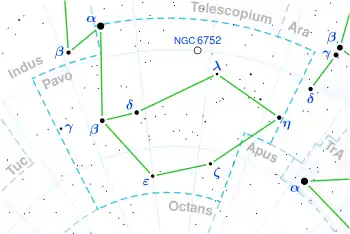 | |
| Observation data Epoch J2000 Equinox J2000 | |
|---|---|
| Constellation | Pavo |
| Right ascension | 17h 45m 43.98605s[1] |
| Declination | −64° 43′ 25.9394″[1] |
| Apparent magnitude (V) | 3.61[2] |
| Characteristics | |
| Spectral type | K2II[3] |
| U−B color index | +1.17[4] |
| B−V color index | +1.19[4] |
| Astrometry | |
| Radial velocity (Rv) | −7.60[5] km/s |
| Proper motion (μ) | RA: −11.96[1] mas/yr Dec.: −56.57[1] mas/yr |
| Parallax (π) | 9.26 ± 0.18 mas[1] |
| Distance | 352 ± 7 ly (108 ± 2 pc) |
| Absolute magnitude (MV) | −1.56[2] |
| Details | |
| Mass | 3.98[6] M☉ |
| Radius | 33.49+8.17 −4.57[7] R☉ |
| Luminosity | 469±20[7] L☉ |
| Surface gravity (log g) | 1.97[8] cgs |
| Temperature | 4,642+354 −480[7] K |
| Metallicity [Fe/H] | +0.15[8] dex |
| Rotational velocity (v sin i) | < 1.5[9] km/s |
| Other designations | |
| Database references | |
| SIMBAD | data |
Eta Pavonis, a name latinized from η Pavonis, is a single[11] star in the southern constellation of Pavo, positioned near the western constellation border next to Ara. It has an orange hue and is visible to the naked eye with an apparent visual magnitude of 3.61.[2] Based on parallax, this object is located at a distance of approximately 350 light-years (108 pc) from the Sun.[1] It has an absolute magnitude of −1.56,[2] and is drifting closer with a radial velocity of −7.6 km/s.[5]
This is an evolved bright giant star with a stellar classification K2II,[3] between the classifications of giant and supergiant. Having exhausted the supply of hydrogen at its core, it has expanded to around 33.5 times the radius of the Sun.[7] The star is radiating 469[7] times the luminosity of the Sun from its enlarged photosphere at an effective temperature of 4,642 K.[7]
References
- 1 2 3 4 5 6 Van Leeuwen, F. (2007). "Validation of the new Hipparcos reduction". Astronomy and Astrophysics. 474 (2): 653–664. arXiv:0708.1752. Bibcode:2007A&A...474..653V. doi:10.1051/0004-6361:20078357. S2CID 18759600. Vizier catalog entry
- 1 2 3 4 Anderson, E.; Francis, Ch. (2012). "XHIP: An extended hipparcos compilation". Astronomy Letters. 38 (5): 331. arXiv:1108.4971. Bibcode:2012AstL...38..331A. doi:10.1134/S1063773712050015. S2CID 119257644. Vizier catalog entry
- 1 2 Houk, N.; Cowley, A. P. (1975). University of Michigan Catalogue of two-dimensional spectral types for the HD stars. Vol. 1. Department of Astronomy, University of Michigan. pp. 19 + 452. Bibcode:1975mcts.book.....H.
- 1 2 Mallama, A. (2014). "Sloan Magnitudes for the Brightest Stars". The Journal of the American Association of Variable Star Observers. 42 (2): 443. Bibcode:2014JAVSO..42..443M.Vizier catalog entry
- 1 2 Gontcharov, G. A. (2006). "Pulkovo Compilation of Radial Velocities for 35 495 Hipparcos stars in a common system". Astronomy Letters. 32 (11): 759–771. arXiv:1606.08053. Bibcode:2006AstL...32..759G. doi:10.1134/S1063773706110065. S2CID 119231169.
- ↑ Charbonnel, C.; Lagarde, N.; Jasniewicz, G.; North, P. L.; Shetrone, M.; Krugler Hollek, J.; Smith, V. V.; Smiljanic, R.; Palacios, A.; Ottoni, G. (2020). "Lithium in red giant stars: Constraining non-standard mixing with large surveys in the Gaia era". Astronomy and Astrophysics. 633: A34. arXiv:1910.12732. Bibcode:2020A&A...633A..34C. doi:10.1051/0004-6361/201936360. S2CID 204907220.
- 1 2 3 4 5 6 Brown, A. G. A.; et al. (Gaia collaboration) (August 2018). "Gaia Data Release 2: Summary of the contents and survey properties". Astronomy & Astrophysics. 616. A1. arXiv:1804.09365. Bibcode:2018A&A...616A...1G. doi:10.1051/0004-6361/201833051. Gaia DR2 record for this source at VizieR.
- 1 2 Luck, R. Earle (2014). "Parameters and Abundances in Luminous Stars". The Astronomical Journal. 147 (6): 137. Bibcode:2014AJ....147..137L. doi:10.1088/0004-6256/147/6/137.
- ↑ De Medeiros, J. R.; Alves, S.; Udry, S.; Andersen, J.; Nordström, B.; Mayor, M. (2014). "A catalog of rotational and radial velocities for evolved stars". Astronomy & Astrophysics. 561: A126. arXiv:1312.3474. Bibcode:2014A&A...561A.126D. doi:10.1051/0004-6361/201220762. S2CID 54046583. Vizier catalog entry
- ↑ "eta Pav". SIMBAD. Centre de données astronomiques de Strasbourg. Retrieved 2020-05-20.
- ↑ Eggleton, P.P.; Tokovinin, A.A. (September 2008). "A catalogue of multiplicity among bright stellar systems". Monthly Notices of the Royal Astronomical Society. 389 (2): 869–879. arXiv:0806.2878. Bibcode:2008MNRAS.389..869E. doi:10.1111/j.1365-2966.2008.13596.x. S2CID 14878976.